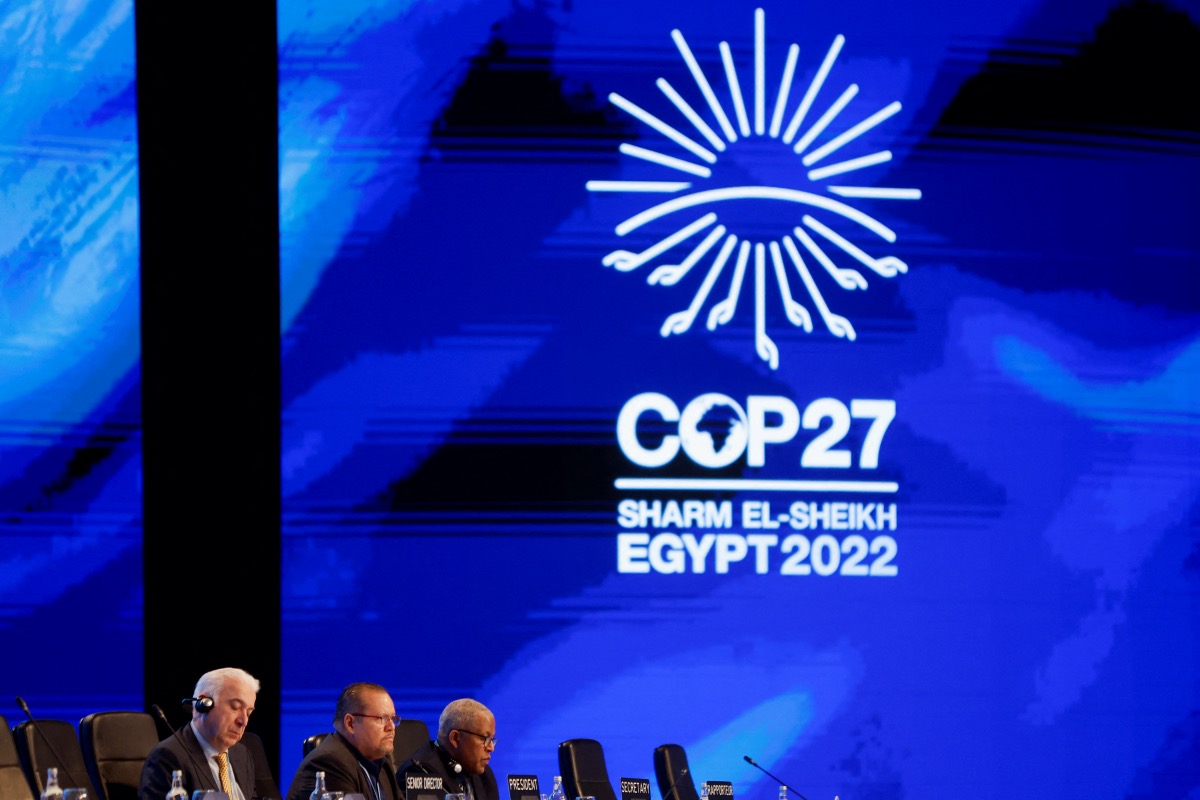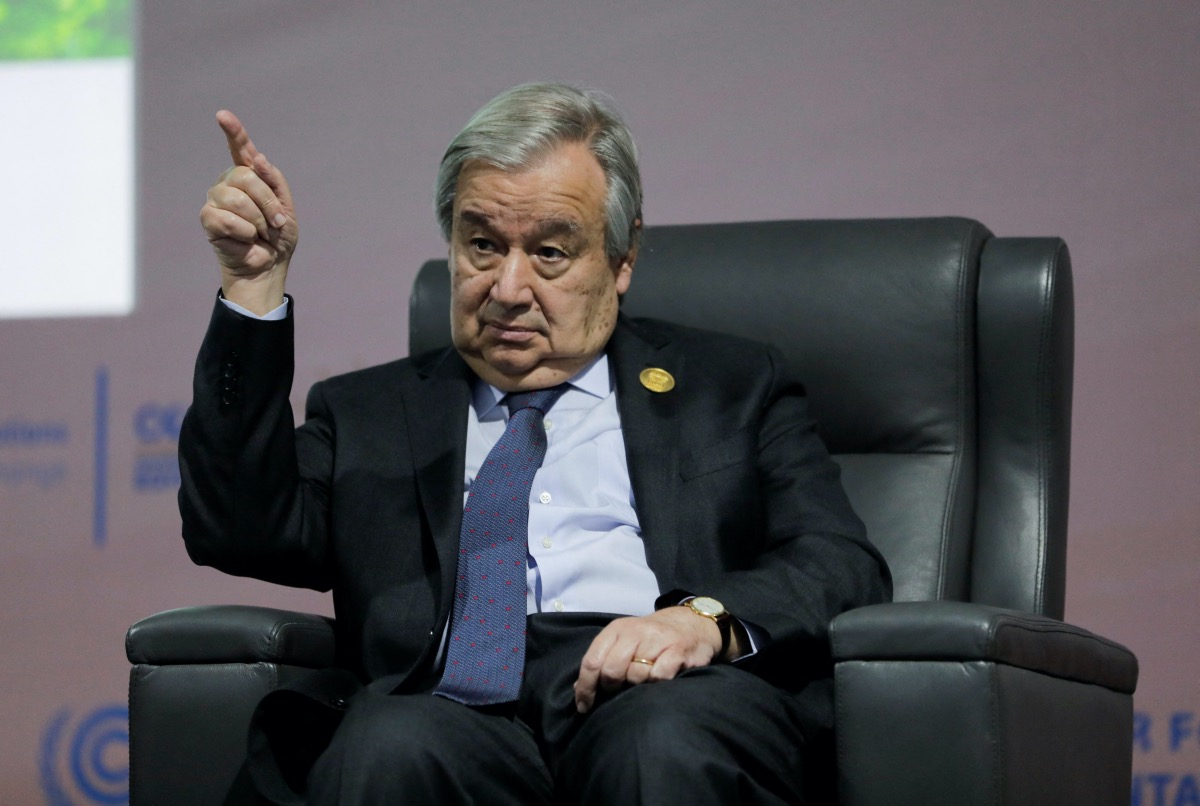Sharm El-Sheikh, Egypt
Reuters
Leaders from poor countries criticised wealthy governments and oil companies for driving global warming, using their speeches on Tuesday at the COP27 climate summit in Egypt to demand that they pay up for damages being inflicted on their economies.
Small island states already buffeted by increasingly violent ocean storms and sea-level rise called on oil companies to shell out some of their huge recent profits, while developing African states called for more international funds for adaptation.

Participants attend the COP27 climate summit in Egypt’s Red Sea resort of Sharm el-Sheikh, Egypt on 8th November. PICTURE: Reuters/Mohammed Salem
“The oil and gas industry continues to earn almost three billion United States dollars daily in profits,” said Gaston Browne, Antigua’s Prime Minister, speaking at the conference on behalf of the Alliance of Small Island States.
ISLAND NATIONS WANT CHINA, INDIA TO PAY FOR CLIMATE DAMAGE
Highly polluting emerging economies including China and India should pay into a climate compensation fund to help countries rebuild after climate change-driven disasters, the Prime Minister of island nation Antigua and Barbuda said on Tuesday.
The comments marked the first time the two nations have been lumped into the list of major emitters that island states say should be held to account for damage already being wrought by global warming.
Prime Minister Gaston Browne, speaking on behalf of the Association of Small Island States negotiating bloc, told reporters the world’s first- and third-biggest greenhouse gas emitters – though still emerging economies – have a responsibility to pay into a fund.
Delegates at the conference agreed to put the topic of loss and damage onto the formal agenda for the first time in the history of international climate negotiations.
“We all know that the People’s Republic of China, India – they’re major polluters, and the polluter must pay,” Brownesaid. “I don’t think that there’s any free pass for any country and I don’t say this with any acrimony.”
In UN climate talks, the phrase “loss and damage” refers to costs already being incurred from climate-fuelled weather extremes or impacts, like rising sea levels.
To date, climate vulnerable countries have called on historical emitters like the United States, United Kingdom and the EU to pay climate reparations. China itself has previously supported the creation of a loss and damage fund but has not said it should pay into it. The EU and United States have said that China, the world’s biggest greenhouse gas emitter, should pay.
India, though a top emitter, has per capita emissions that are significantly lower than the world average.
AOSIS wants a full commitment to launch a multibillion dollar fund by 2024.
Egypt’s lead climate negotiator Mohamed Nasr told Reuters that the goal for the COP27 negotiations was to get some clarity on the way forward for loss and damage, but that there was still a wide range of views.
“Now we have a starting point, so it is more streamlined and more focused and hopefully by the end of the two weeks we’ll have something that would identify the road map, the milestones to deliver,” he said.
Over the coming year the goal would be to identify a mechanism for delivering loss and damage funding.
“We’ll be looking at the different options. Is it a facility? Is it a new fund? Is it the existing funds? I mean there are a lot of options,” he said. “What we heard from many countries is that they want to keep their options open.”
Another AOSIS negotiator, Deputy Environment Minister of International Cooperation Milagros De Camps, said from the perspective of island nations like hers that face more frequent and powerful natural disasters like hurricanes and cyclones the need for a new dedicated compensation fund is clear.
“We need specific fund fit for purpose…a separate operating entity,” she told reporters. “This is a matter of survival for small island developing states.”
– VALERIE VOLCOVICI and AIDAN LEWIS, Sharm El-Sheikh, Egypt/Reuters
“It is about time that these companies are made to pay a global carbon tax on their profits as a source of funding for loss and damage,” he said. “While they are profiting, the planet is burning.”
Nikenike Vurobaravu, the president of the island nation of Vanuatu, said it wanted the International Court of Justice to help ensure future generations’ rights were not being violated by nations lagging on climate change.
The comments reflected the tension in international climate negotiations between rich and poor states, as delegates attended the second full day of the two-week UN conference in the seaside resort town of Sharm el-Sheikh.
Wealthy western countries tend to be the most vocal advocates of slashing emissions but are also the ones that have contributed the most greenhouse gases after more than a century of fossil fuel-driven industrialisation.
Multi-billion-dollar oil industry profits since Russia’s invasion of Ukraine in February – which has roiled markets and disrupted supplies – have also angered governments worldwide concerned about climate change and rampant consumer inflation.
US President Joe Biden this month said the industry was raking in “war profits” and proposed a windfall tax, an idea that has little chance of passing a divided Congress. The United Kingdom has already imposed a windfall profits tax on oil producers, with proceeds meant to defray household energy costs.
But some countries at the conference were more likely to direct their frustration at rich governments, not drillers.
Senegal’s President Macky Sall told the conference poor developing countries in Africa needed increased funding from wealthy nations for adaptation to worsening climate change and would resist calls for an immediate shift away from fossil fuels African countries need to expand their economies.
“Let’s be clear, we are in favour of reduction of greenhouse gas emissions. But we Africans cannot accept that our vital interests be ignored,” he said.
China’s special climate envoy Xie Zhenhua said on Tuesday that Beijing is committed to reaching carbon neutrality in the world’s top greenhouse gas emitter, and believed multilateralism and cooperation is key to solving global climate change.
“No matter how much the external environment changes, and no matter how many challenges we face, China has firm determination to achieve this vision of carbon neutrality,” he told delegates.
The hosts of the COP27 climate talks on Tuesday launched a global plan to help the world’s poorest communities withstand the impacts of global warming, including targets for sustainable farming, mangrove restoration to reduce coastal flooding, and access to clean cookstoves.
The head of the World Trade Organization, meanwhile, told Reuters she aimed to revive negotiations on a global environmental trade deal as part of efforts to give the trade watchdog a bigger role in tackling climate change.
Billions for war
Ukrainian President Volodymyr Zelenskiy told conference delegates in a video message that Russia’s invasion of Ukraine has distracted world governments from efforts to combat climate change and boosted demand for coal.
“There can be no effective climate policy without the peace,” he said.
Scores of other heads of state and government spoke on Monday and Tuesday but many of the world’s biggest polluters – including the United States and India – have yet to hit the podium.
Biden will not arrive until Friday – after Tuesday’s midterm elections in the United States – but his delegation opened its pavilion at the COP27 venue on Tuesday and Special Envoy John Kerry was making the rounds.

United Nations Secretary-General Antonio Guterres attends the COP27 climate summit in Sharm el-Sheikh, Egypt, on 8th November. PICTURE: Reuters/Mohamed Abd El Ghany
Conference host Egypt was facing pressure over its jailing of Egyptian-British blogger Alaa Abd el-Fattah, who rose to prominence during Egypt’s 2011 popular uprising but has been detained for most of the time since and is now on hunger strike.
His family said on Tuesday they had not heard from him since he had been due to stop drinking water two days ago.
Egyptian President Abdel Fattah al-Sisi’s government came to power after heading the 2013 overthrow of Egypt’s first democratically elected leader, and has drawn human rights criticism after subsequent bloody crackdowns on protesters and the detention of dissidents.
His government has been hoping its hosting of the COP27 conference would give it an injection of international legitimacy at a time its economy has been struggling.






